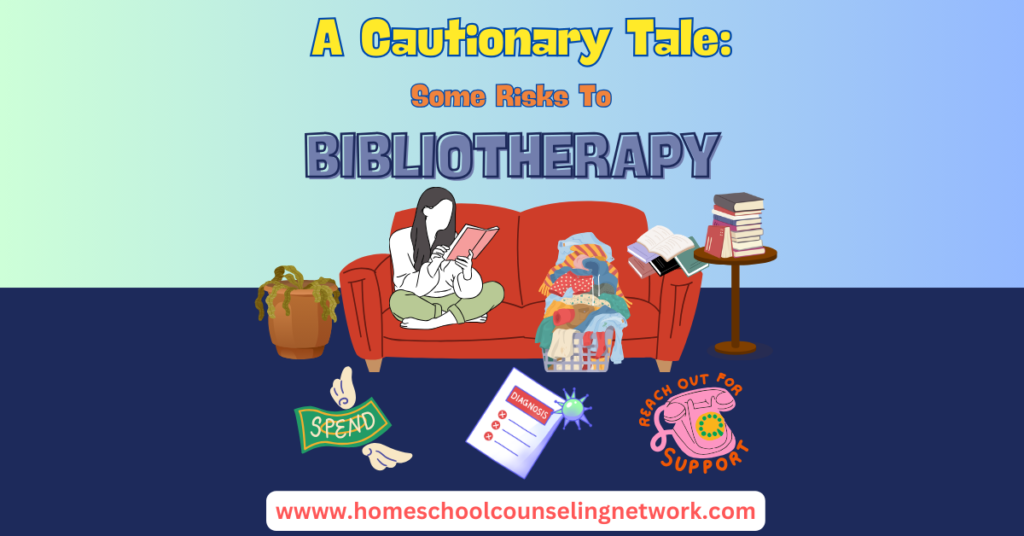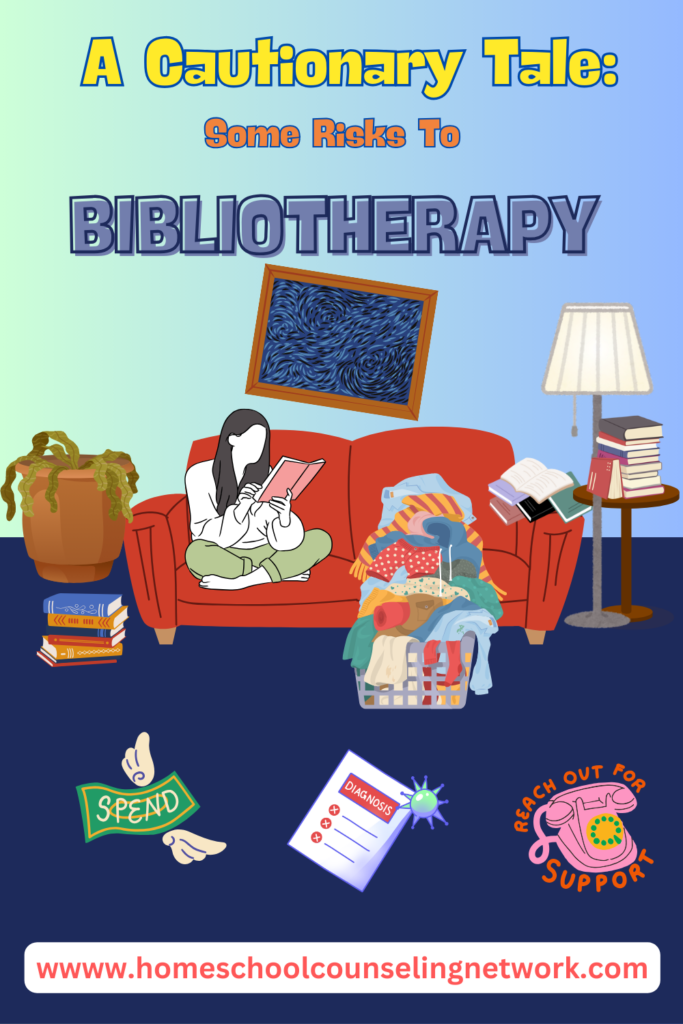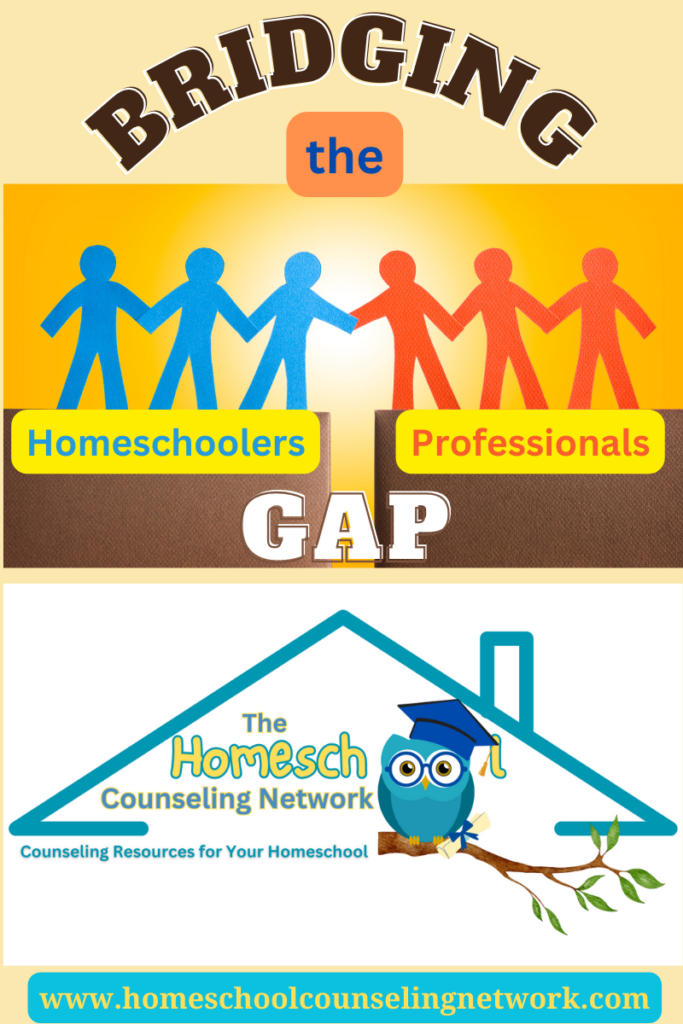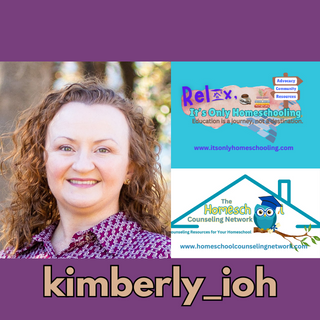A Cautionary Tale: Some Risks Associated With Bibliotherapy

In previous posts, we introduced you to the therapeutic practice of bibliotherapy, highlighted the benefits of bibliotherapy, and invited you to join HCN’s Bibliotherapy Book Club.
With every therapeutic technique, there are benefits. However, there are also drawbacks. Today, I am going to share a few with you.
A Word Of Caution
While overall research indicates a plethora of positive benefits from practicing bibliotherapy, in full transparency I feel obligated to share some of the risks associated with the practice.
Over-reaching. Excited by this new passion and in pursuit of self-improvement, sometimes you can miss the forest for the trees. When you genuinely love to read and learn, it is easy to become overly absorbed in reading for the sheer pleasure of reading.
Wishing to absorb knowledge like a sponge, you forget to pause and actually put into practice the new knowledge you have acquired. Instead, you keep adding more techniques, new exercises, and bigger goals into the mix without ever actually seeing any of them through to completion. You abandon one unachievable goal for the next more unachievable goal and end up feeling overwhelmed, frustrated, disillusioned, and defeated.
Over-engagement. If you find yourself spending so much time reading until you neglect relationships, self-care, and responsibilities, it’s time to put the book down. I love to get lost in a good book as much as the next bibliophile but reasonable limits must be set.
Over-spending. Much like over-engagement, overspending on reading material can happen quite easily. This is especially true if you and your family are bibliophiles like mine.
Limited Availability of Materials. If you are a regular patron of your local library like my family it is second nature to have a long list of items in your hold or request queue. When trying to keep your book-buying budget in check, your local library (including its digital lending services) can be a great asset. Oftentimes, however, you may have to wait in line for more popular titles. Conversely, more obscure titles may not be included in your library’s catalog. If this is the case, ask a library employee about ordering specific titles.
Self-Diagnosis. It was the summer before I was slated to start graduate school when I purchased my first copy of the then DSM-IV-TR (now DSM 5 TR), the manual used by mental health professionals to diagnose mental disorders. Within a week I had skimmed the manual cover to cover and became convinced that I was not equipped to enter a course of study where I was to learn how to help others care for their mental health. Having self-diagnosed more than a few disorders, I was ready to cut and run. Thankfully, I stayed. A few weeks later, classes began and I attended a social gathering with my newly enrolled fellow graduate students and a few faculty members who were to mold us into the helping professionals we were destined to become over the next few years. Over cocktails and canapes, I learned my fears and my habit of self-diagnosis was quite common among green graduate students. In truth, it’s funny now but it felt very real in the moment. Only licensed professionals should diagnose, and not themselves.
Need For Support. Depending on your selection of reading material and the goal you wish to achieve, you may need a professional to help you work through exercises, process past trauma, challenge negative patterns of thinking, or learn healthy forms of communication to improve relationships.
Even the seemingly most innocuous reading material may dredge up past unresolved issues. If you find yourself in this situation, please know you are not alone. Reach out for external support, motivation, or treatment. Here at HCN, we have a directory of mental health professionals available to help provide you with professional mental health services. You can also contact your insurance provider for a list of mental health professionals in the network in your area.
Helpful Hints
While these pitfalls are rare, here are some tips to help keep you in check:
Set Limits. Budgeting your time and your money responsibly will help you use the tool of bibliotherapy wisely. Slow down on the click-happy finger and take a few deep breaths before pressing add to cart. Consider swapping books with friends or family members, buying second hand, or taking advantage of your local library.
Slow Down. Remember earlier when we talked about missing the forest for the trees? Excited by the prospect of change, we can easily race through the material and forget to pause to process what we have read. Rome wasn’t built in a day. Change takes time. Building new habits takes time. Patience is earned through trials.
Set Realistic Expectations. Learning new skills to help improve our relationships, whether with ourselves or others, is exciting. Obviously, we want to make a change for the better or we would not have bothered wasting the time on the material to begin with. We want to do all the things, all at once but attempting to do so sets up us for failure. Eat the elephant one bite at a time with mini-goals rather than one large goal.
Celebrate The Journey, Not The Destination. We’ve read the book. We’re empowered to do the work. (or maybe we have already done some of the work). We have scaled the mountain and now at the top, we become disillusioned to learn that what we see at the peak is not the valley below signaling accomplishment but rather more mountains in the distance ready and waiting to be climbed.
Now what? We can A. deflate like a balloon and toss the book in the trash or B. Sit down to rest, restore, and recover our energy as we reflect on how far we’ve already come. Growth is a lifelong process.
Set Achievable Goals. As we are resting and processing (the aid of a journal or an accompanying workbook is very useful here), we are forced to slow down and really think about what it is we want to accomplish overall, and what we want to do first.
We all have to walk before we can run. What do we want to change? Maybe we don’t want to change anything other than our mindset. Acceptance is a powerful tool and no easy feat to achieve. Whatever goal you choose, start small. Define it clearly. Set baby steps along the way and reward yourself for scaling the hills and the mountains. Both are a part of the journey.
Seek Support. If you are uncertain about something you have read, reach out for support. Consider joining a group or book club to discuss your reading selection further. HCN has a private Facebook group dedicated to its Bibliotherapy Book Club Members.
Seek Treatment. Bibliotherapy is a powerful therapeutic tool that can be used with the aid of a therapist or without. However, there are certain cases where the services of a trained mental health professional are highly recommended. For example, if you are struggling with an inability to differentiate between what is real and what is not (i.e., confusing fictional characters with real people), are dealing with complex issues (i.e., abuse/trauma, history of a diagnosed mental health condition such as mood disorders, personality disorders, etc.), or if you are experiencing thoughts of harming yourself or others.

HCN Bridging The Gap: Counseling Resources For Your Homeschool
The Homeschool Counseling Network was founded to help bridge the gap between homeschooling families and professionals in coaching, education, mental health, and therapy equipped to help support them on their education journey. At HCN, we offer multiple directories of professionals, blog posts, and a free searchable video library to help you along the way in your home education journey.

Keep In Touch
Be sure you do not miss a blog post by signing up for our email list, liking our Facebook, Instagram, Linked In, or Pinterest pages, or subscribing to our YouTube channel.
Like what you see here? Sharing is caring!
Blessings,
Kimberly Bennett, LPC
Founder/CEO It’s Only Homeschooling
Founder/CEO The Homeschool Counseling Network

This website is not a professional counseling website and nothing here should be construed as professional counseling advice. Although Kimberly Bennett, LPC is a Licensed Professional Counselor, she is not your counselor, and no counselor-client relationship is established unless she has signed an agreement with you. All information provided through this website is for informational and educational purposes only.